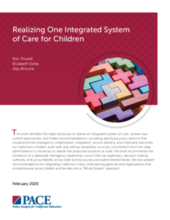Displaying 301 - 310 of 1028
This chapter of Foster Care and Best Interests of the Child provides a template for evaluating and reforming the U.S. foster care system to prioritize the best interests of children.
This report provides an overview of a February 2020 meeting - hosted by the Rockefeller Foundation, Daniel Schwartz, and the Miracle Foundation - held in Bellagio, Italy focused on a cross sectoral ‘outside look in’ examination of the issue of children’s care.
In this video, the First Minister of Scotland, Nicola Sturgeon, issues a statement on the publication of the final report of the Scottish Independent Care Review.
One of several reports produced as part of the Scottish Independent Care Review, The Plan outlines how to implement the changes recommended in The Promise.
One of several reports produced as part of the Scottish Independent Care Review, this report demonstrates the current legislative framework of the Scottish care system and how it must change to achieve The Promise.
One of several reports produced as part of the Scottish Independent Care Review, The Promise sets out an overall view of what the new approach to children's care in Scotland should be.
After its launch, several organizations issued statements in support of the Scottish Independent Care Review and its call to action, outlining their commitment to ensuring the rights and wellbeing of children and families in Scotland and listening to their voices.
One of several reports produced as part of the Scottish Independent Care Review, The Pinky Promise presents a young reader-friendly version of The Promise report, which sets out an overall view of what the new approach to children's care in Scotland should be.
This brief identifies the steps necessary to realize an integrated system of care, reviews two current approaches, and makes recommendations—including specifying policy reforms that would promote interagency collaboration, integration, service delivery, and improved outcomes for California’s children, both with and without disabilities.
The work of the Independant Care Review in Scotland culminated in the publication of seven reports in February 2020, including 'The Promise' which set out what needs to change in the care system to ensure children and young people grow up loved, safe and respected.







